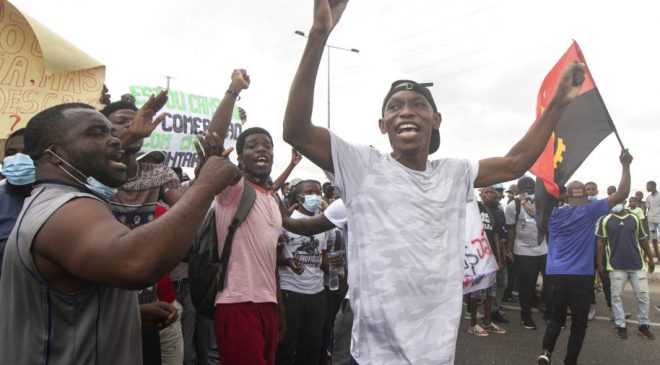
Angolan security forces have carried out more than a dozen unlawful killings and numerous other serious abuses against political activists and peaceful protesters since January 2023, Human Rights Watch said today. The government should ensure urgent, impartial, and transparent investigations into alleged rights violations and appropriately sanction or prosecute security force members responsible.
Members of the Angola National Police and its Criminal Investigation Service, and the State Security and Intelligence Service have been implicated in unlawful killings of at least 15 people, as well as the arbitrary arrests and detention of hundreds more. Those targeted include social and political activists, outspoken artists, and protesters who organized or participated in peaceful anti-government activities throughout the country.
“The Angolan police appear to be targeting those who speak out against government policies,” said Zenaida Machado, senior Africa researcher at Human Rights Watch. “Angolan authorities should urgently act to end abusive police policies and practices and ensure that there is justice for victims and their family members.”
Between January and June 2023, Human Rights Watch interviewed by phone 32 people, including victims of abuses and their relatives, witnesses, and security sources in Luanda, the capital, and in Cabinda and Bié.
In February, men who identified themselves as Criminal Investigation Service members took into custody a group of young men whose bodies were found three days later at a hospital morgue in Luanda. A 24-year-old friend of the victims said that the officers had been monitoring the group, who were known for taking part in various anti-government protests across the city. “I know they [the police] don’t like us,” he said. “But I never imagined they might kill.”
Security forces have also arbitrarily arrested and detained people who publicly criticized the government. The police detained the activist rapper known as Kamesu Voz Seca for five days without charge after stopping his car one night at a roadblock in Luanda and finding flyers with “President, go” and similar messages.
The authorities detained a taxi driver and accused him of promoting acts of rebellion after a video went viral on social media in which he imitates the late rebel leader Jonas Savimbi and calls for the removal from power of the ruling party, the Popular Movement for the Liberation of Angola (Movimento Popular de Libertação de Angola, MPLA).
Angola’s government is obligated to respect the human rights to life, freedom of expression, peaceful assembly, and association, guaranteed under Angola’s constitution as well as in international human rights treaties that Angola has ratified, including the African Charter on Human and Peoples’ Rights and the International Covenant on Civil and Political Rights.
However, for decades the Angolan security forces have violated these fundamental rights, committing extrajudicial executions and other unlawful killings, using excessive and unnecessary force against protesters, and harassing, arbitrarily arresting, and detaining opposition activists.
In recent years the government has made some attempts to improve law enforcement, notably firing abusive police officers, incorporating human rights in the police training curriculum, and regularly hosting human rights activities in partnership with the United Nations and domestic nongovernmental organizations.
Criminal prosecutions of police officers for unlawful use of force remain rare. Attempts to improve police conduct have not been supported by strong accountability measures such as disciplinary actions and criminal prosecutions, with many cases of police abuse going unpunished. Angola lacks an independent body to address complaints about wrongful use of police force, as noted by the UN Human Rights Committee in 2013.
The Angolan government should urgently adopt concrete and meaningful reforms for the conduct and oversight of police to promote full respect for human rights and the rule of law, Human Rights Watch said. The international community, including the Southern African Development Community (SADC), the African Union, the European Union, and the United Nations should privately and publicly urge the Angolan government to hold accountable those responsible for these abuses.
“Brutal police crackdowns on protests and peaceful political activity deny all Angolans their rights to participate in the political process and in Angola’s future,” Machado said. “Angolan authorities should urgently take meaningful steps to address unlawful policing or expect further police abuses in the future.”
